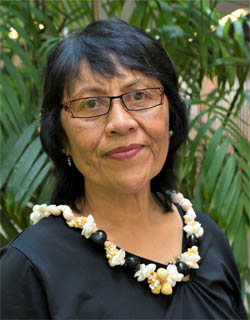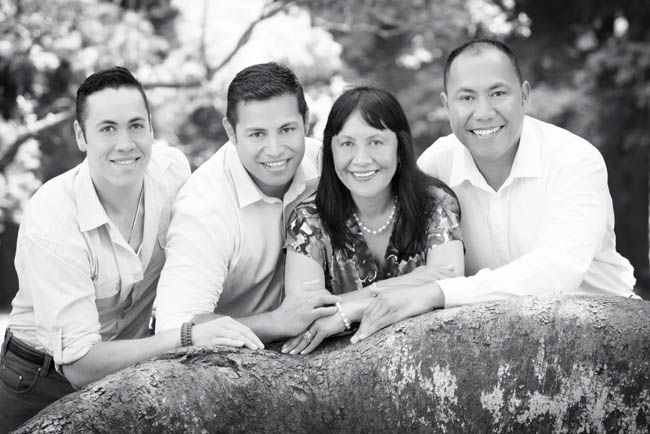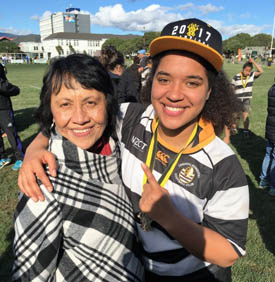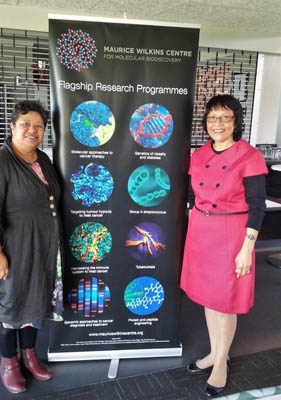From Curious Minds (September 2017)
Ofa Dewes
Ofa (Fiji-born Rotuman/Tongan/Tuvaluan, Ngāti Porou affiliate) is a Pacific health researcher at the Maurice Wilkins Centre for Molecular Biodiscovery and at Auckland University's School of Nursing.
What do you do on an average work day?
 |
|---|
My average office day begins very early with a coffee and quick catch up on "news" and a laugh with colleagues over something funny I'd read, such as in The Giant of the Senate by Senator Al Franken.
My diary lists a variety of daily activities which I check along with my mailbox for urgent replies. I also read current publications I'm interested in, meet with our research team to discuss progress and follow-up actions, participate in other project meetings or teleconferences, review transcripts, analyse data, and draft an ethics or grant application, or work on writing a manuscript.
If I'm collecting data, I'll spend most of the day in the community meeting participants (e.g. at home, school, in a clinic, or workplace), talking through the study again and answering any further questions before obtaining informed consent, then conducting interview/completing questionnaires and, if required, collecting blood samples.
What did you study at school? And after high school?
I went to a Catholic Girls' school in Fiji where I studied a variety of subjects including English - my second language. I also learned about the Catholic religion (I'm a Methodist). Other subjects included social studies, health science, geography, mathematics, bookkeeping, and home economics. We had time for sports too. Outside of school, I learned to read music and play the piano (classical). My favourite subjects were social science and biology.
I wanted to train as a nurse or teacher in Fiji, but instead my parents sent me to Christchurch to learn commerce and office administration, and continue with piano lessons.
 |
|---|
| Ofa and her sons |
Was your study directly related to what you do now?
My initial studies enabled me to work in the public and international sectors (United Nations Development Programme Regional Office) in Fiji, and the private sector in New Zealand.
Strong personal and professional links with a number of Pacific countries influenced the direction of the research in my doctoral thesis, Obesity Prevention among Pacific adolescents: Is there a role for the church?
In this, I combined both quantitative and qualitative methods. The data for the quantitative component came from the Obesity Prevention in Communities (OPIC) four-country regional study, for which I managed the New Zealand baseline data collection. In addition to analysing the data from 2,495 Pacific students, I conducted a community meeting with 50 church leaders, individual meetings with the ministers of 20 churches, and a separate qualitative survey of 23 church leaders to gain a deeper understanding of the issues associated with obesity in Pacific church communities in Auckland.
These work and study opportunities established a strong platform for what I do now, especially in Pacific health research leadership, developing a talent pool of Pacific research scientists, strengthening research collaborations, and engaging communities for better health and education results.
 |
|---|
| Ofa supporting the Oriental Bay Rongotai Women's Rugby champions |
What would you like to share with young women who are thinking about their career choices right now?
Have fun thinking about your career choices and know that you're not alone.
Think about who you'd like to tell your dream job to - friends, family, teacher, lecturer, supervisor, or careers counsellor? Their support can provide a useful guide as you think through your career choices. Do you need information on pathways to your chosen career, scholarships you may apply for, summer studentships/short-term training programmes to consider, or opportunities for work experience? Would it be helpful to ask for feedback on your performance?
Enjoy the process of thinking through your career choices and opportunities to put your talents to work not only for your own benefit, but also for the benefit of others.
And don't be afraid to change course if it's the right thing to do – follow your heart!
 |
|---|
| Ofa (right) with colleague at the Auckland Expo for high school students |
What are some of your career highlights sofar?
Some of my career highlights include securing career development funds to support young Pacific women in STEM (science, technology, engineering, maths), engaging high school students in a real world scientific research project, and participating in leadership positions for the Health Research Council and the National Science Challenges (Healthier Lives and Ageing Well).
Why do you believe engaging in science, technology, engineering and maths (STEM) is important to New Zealand?
Everyone in New Zealand has the freedom of choice to engage with STEM and apply their learnings in so many different ways at home, school, work, or in service to community – it is not limited to the laboratory.
Exercising our choice effectively is an important way of motivating people to enjoy and value life-long learning, put their learning to good use, create employment opportunities and reduce inequalities for the overall benefit of New Zealanders.
Why is it important to have more women working in STEM?
We need more women working in STEM if we are to achieve the United Nations sustainable development goals that value diversity, gender equality, easy access to quality education, health services, and work opportunities.
More women in STEM will also drive effective partnerships that lead to justice for women and girls in NZ, the Pacific region, and the world.
Ofa Dewes is Fiji-born of Rotuman/Tongan/Tuvaluan ethnicity, with affiliation to Ngāti Porou. She is a Pacific health researcher of the Maurice Wilkins Centre/Department of Molecular Medicine & Pathology, and the School of Nursing’s Te Ārai Palliative Care and End of Life Research Group, University of Auckland. For more information, see wearethepacificocean.com or follow Ofa on Twitter @Pasifik_Ocean.
This profile is part of our series of girls and women in STEM.
In July 2017 Ofa Dewes was awarded an HRC Pacific grant of NZ$599,987 for her project "Differences in fructose absorption in Pacific adolescents.





